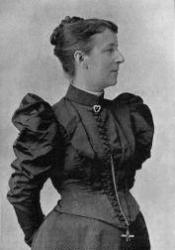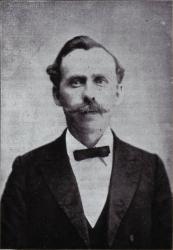Planning worship?
Check out our sister site, ZeteoSearch.org,
for 20+ additional resources related to your search.
- |
User Links
Person Results
‹ Return to hymnal


Export as CSV
Isaac Newton Carman
Person Name: I. N. Carman Hymnal Number: d123 Author of "Yonder over the rolling river" in The New Alphabetical Hymnal Carman, Isaac Newton. Bethany College, class of 1855. Minister, Rochester, New York, 1906.
--J. Wiegand, DNAH Archives
Isaac Newton Carman
Laura Ormiston Chant

1848 - 1923 Person Name: Laura O. D. Chant Hymnal Number: d225 Author of "Light of the world, faint were our weary feet With wandering far" in The New Alphabetical Hymnal Chant, Laura Ormiston, née Dibdin, daughter of F. W. Dibdin, O.E., was bom at Woolastone, Gloucestershire, in 1848, was for some time Sister of the Sophia Wards of the London Hospital, and married to Thomas Chant, M.R.C.S., of Bridgewater, in 1877. Of Mrs. Chant's hymns, these are in common use:—
1. Beyond the far horizon. [Heaven.] Written at the request of Stopford A. Brooke for his Christian Hymns, 1891. It is also printed as a leaflet in 5 stanzas of 8 lines.
2. Light of the world, faint were our weary feet. [Christ the Light of the World.] Written in June, 1901, at the request of the Rev. S. Collier, Superintendent of the Central Wesleyan Mission in Manchester. As the hymn is regarded by many as an imitation of Cardinal Newman's "Lead, kindly light," &c, Mrs. Chant's account of its origin is worthy of attention:—
Mr. Collier "said how amazingly fond the rescued men were of the tune 'Sandon,' but that 'Lead, kindly light,' though so beautiful, was not an adequate expression of their feelings, and would I try and write something as tender, but gladder than Newman's lovely hymn. I did my best to express myself, and so gave what was wanted" The hymn was first printed as a broadsheet, and then passed into The Methodist Hymn Book, 1904, and other collections.
3. Silence, 0 earth, and listen to the song. [Spring.] This hymn is of more than usual excellence, and is worthy of attention. It is printed as a broadsheet, and may be had at Albemarle House, E. Twickenham.
--John Julian, Dictionary of Hymnology, New Supplement (1907)
Laura Ormiston Chant
Mrs. Harriett Warner Re Qua
1843 - 1929 Person Name: Harriett Warner ReQua Hymnal Number: d134 Author of "Is this not the land of Beulah" in The New Alphabetical Hymnal Harriett A Warner Re Qua USA 1843-1929. It is surmised that she was born in the midwest, possibly IA, and remained there most of her life. She married minister, Eugene W F Re Qua, a Methodist Episcopal Church minister who pastored churches, mostly in IA, and they had a daughter, Beatrice. She wrote a book titled, “Stones for the temple” 1885). She died at Des Moines, IA.
John Perry
Mrs. Harriett Warner Re Qua
Thomas Ryder
Person Name: T. Ryder Hymnal Number: d48 Author of "Buried with Christ and raised with him too" in The New Alphabetical Hymnal
Thomas Ryder
Karl Simrock
Hymnal Number: d241 Author of "Cradle song" in The New Alphabetical Hymnal
Karl Simrock
Alanson Wilcox
1832 - 1924 Person Name: A. Wilcox Hymnal Number: d483 Author of "When the King comes in his glory" in The New Alphabetical Hymnal
Alanson Wilcox
W. S. Stroud
Hymnal Number: d201 Author of "He has promised all the faithful" in The New Alphabetical Hymnal
W. S. Stroud
Clifford R. Lanman
Hymnal Number: d209 Author of "I love him" in The New Alphabetical Hymnal
Clifford R. Lanman
William A. Spencer
1840 - 1901 Hymnal Number: d475 Author of "I shall be like him" in The New Alphabetical Hymnal
William A. Spencer
John Moody McCaleb

1861 - 1953 Person Name: J. M. McCaleb Hymnal Number: d304 Author of "The blessed gospel is for all" in The New Alphabetical Hymnal J. M. McCaleb was a Churches of Christ missionary to Japan from 1892 to 1941. He was influential in spurring global missions in his church fellowship. After returning to the U.S., he taught for Pepperdine University.
Source: McCaleb, John Moody (1861-1953): Pioneer missionary for Churches of Christ, History of Missiology, School of Theology, Boston University
John Moody McCaleb


 My Starred Hymns
My Starred Hymns


